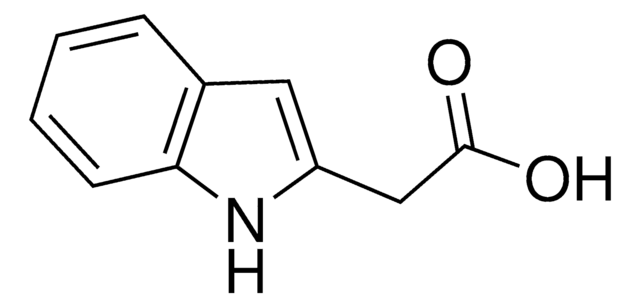I5148
Indole-3-acetic acid sodium salt
BioReagent, suitable for plant cell culture, ≥98%
Sinónimos:
3-IAA, IAA, indolylacetic acid, Heteroauxin
About This Item
Productos recomendados
grado
for molecular biology
Línea del producto
BioReagent
Análisis
≥98%
formulario
powder
técnicas
cell culture | plant: suitable
solubilidad
H2O: soluble
idoneidad
suitable for (Plant cell culture)
aplicaciones
agriculture
temp. de almacenamiento
2-8°C
cadena SMILES
[Na+].[O-]C(=O)Cc1c[nH]c2ccccc12
InChI
1S/C10H9NO2.Na/c12-10(13)5-7-6-11-9-4-2-1-3-8(7)9;/h1-4,6,11H,5H2,(H,12,13);/q;+1/p-1
Clave InChI
YGSPWCVTJRFZEL-UHFFFAOYSA-M
Categorías relacionadas
Descripción general
Aplicación
- to alter the root developmental processes in Arabidopsis thaliana seedlings
- as a standard for the determination of IAA by high-performance liquid chromatography using Chlorella sorokiniana and Azospirillum brasilense sample culture media
- as one of the plant hormone to treat interspecific hybrids (Elaeis oleifera Cortés x Elaeis guineensis Jacq.) and study its effect on bunch formation in parthenocarpic fruits and oil production in oil palm
- as a supplement in culture media to induce mitotic slippage in human cell lines
- as a supplement in a shoot induction medium (SIM) for shooting and shoot elongation from explant
Acciones bioquímicas o fisiológicas
Código de clase de almacenamiento
11 - Combustible Solids
Clase de riesgo para el agua (WGK)
WGK 3
Punto de inflamabilidad (°F)
Not applicable
Punto de inflamabilidad (°C)
Not applicable
Equipo de protección personal
Eyeshields, Gloves, type N95 (US)
Certificados de análisis (COA)
Busque Certificados de análisis (COA) introduciendo el número de lote del producto. Los números de lote se encuentran en la etiqueta del producto después de las palabras «Lot» o «Batch»
¿Ya tiene este producto?
Encuentre la documentación para los productos que ha comprado recientemente en la Biblioteca de documentos.
Los clientes también vieron
Nuestro equipo de científicos tiene experiencia en todas las áreas de investigación: Ciencias de la vida, Ciencia de los materiales, Síntesis química, Cromatografía, Analítica y muchas otras.
Póngase en contacto con el Servicio técnico









